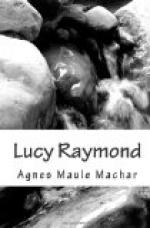It was with a beating heart that she put the question, “Is Miss Lucy Raymond at home?” to be answered in the negative by the servant, who inwardly wondered what a girl so poorly dressed could want with Miss Lucy. Waiting was out of the question,—she would be late enough in getting back as it was,—so she sorrowfully turned away, without leaving any message. It was a great disappointment, and, tired and dispirited, she made her way back.
There was another reason, besides want of time, to prevent her making a second attempt. The clothes with which she had been provided on leaving Mill Bank Farm were almost worn out with the hard work she had to do, and Mrs. Williams had as yet done nothing towards fulfilling her promise of giving her necessary clothing, although Nelly’s tattered frock was worn beyond all possibility of repairing. Nelly was conscious of the doubtful look with which she was regarded when she asked for Lucy, and she shrank from again encountering it, and perhaps bringing discredit on Miss Lucy in the eyes of her city friends by her own disreputable appearance.
One afternoon in June—Mrs. Williams and her daughter being out—Nelly, having a few minutes to spare, was standing at the open door, listening to the plaintive strains of an organ-grinder who was playing close by. His dark Italian face looked sad and careworn, and the little girl beside him, evidently his daughter from the resemblance between them, looked so pale and feeble, that it seemed as if her little thin hands could scarcely support the tambourine she was ringing in accompaniment to a little plaintive song. Nelly enjoyed the performance exceedingly, but her admiration did not appear to be shared by those whose applause was of more consequence, for not a single penny found its way into the poor man’s hat, either from the inmates of the house or from the juvenile bystanders. His discouraged air, and the sad, wistful eyes of the little girl, touched Nelly’s warm Irish heart, as he leaned on Mrs. Williams’ doorsteps to rest himself while he set down his organ, experience having taught him that it was a useless waste of strength to play before that door.
Nelly, seeing how hot and tired he looked, impulsively asked the poor man whether he would walk in and sit down, never stopping to think whether she had a right to do so. He looked up, surprised at the invitation, but thankfully accepted it, and Nelly brought two chairs into the hall for him and the little girl. Then, as the only entertainment she was able to supply, she filled two glasses with the coldest water she could find, and shyly offered them to her guests.
“Ah, it is good,” said the organ-grinder, when he had drained his glass. “Many thanks,” he added, in his foreign accent; and the little girl looked up into Nelly’s face with the sweetest, most expressive, grateful smile.
“Now,” said the Italian, after having rested a little, “you love music—is it not true?—or you would not be so kind to us. I will play for you.”




